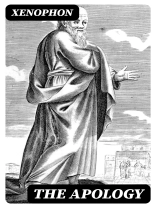In ‘The Apology, ‘ Xenophon offers a profound defense of Socrates, exploring themes of virtue, justice, and the complexities of human morality. Written in a clear yet philosophical style, this work reflects the Socratic method, encouraging readers to engage in critical thought and self-examination. Set against the backdrop of Socratic thought in Ancient Greece, Xenophon’s narrative sheds light on the societal perceptions of morality and virtue during a tumultuous period, marked by the Athenian trial of Socrates. The dialogues are structured to resemble an informed and reasoned defense, inviting discourse and reflection on the nature of ethics and the pursuit of knowledge. Xenophon, an esteemed student of Socrates and a contemporary of Plato, was deeply influenced by his mentor’s teachings. His background as a soldier, historian, and philosopher shaped his perspectives on leadership, justice, and civic duty. Having witnessed firsthand the political upheaval of his time, Xenophon was motivated to preserve Socratic ideals, emphasizing the importance of individual moral responsibility and philosophical inquiry. ‘The Apology’ is essential reading for those interested in philosophy, ethics, and the legacy of Socratic thought. It not only serves as an insightful defense of an enigmatic figure but also as a timeless exploration of the moral questions that resonate throughout human existence. Engage with Xenophon’s articulate prose and allow it to spark introspection on the values that define us.
Over de auteur
Xenophon (c. 430–354 BC) was an ancient Greek historian, philosopher, soldier, and a disciple of Socrates. His contributions to literature are invaluable, particularly for his historical and philosophical writings which offer a window into Greek society and military affairs of his time. Xenophon’s body of work spans numerous subjects, but he is perhaps most celebrated for his historical accounts, like ‘Anabasis’, which documents the expedition of the Ten Thousand, and ‘Hellenica’, which covers Greek history following the end of Thucydides’s work.
One of Xenophon’s significant philosophical texts is ‘The Apology’, wherein he provides his own version of the defense speech given by Socrates during his trial in 399 BC, presenting a contrasting perspective to that of his contemporary, Plato. Xenophon’s ‘Apology’ tends to focus more on the personal characteristics of Socrates and the practicality of his philosophical viewpoints, thus serving as a crucial source for Socratic studies. His literary style is known for its clarity, simplicity, and straightforward narrative form which differed from the often ornate prose of his counterparts. Xenophon’s works are studied for their historical accuracy and detail, and they contribute profoundly to our understanding of ancient Greek culture, military strategy, and philosophy.












